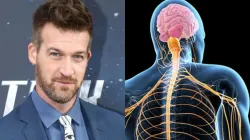'Captain Marvel' star Kenneth Mitchell dies due to ALS, know everything about this fatal neuro disorder
Managing people with ALS requires a multi-disciplinary approach including the physician physiotherapists respiratory therapists psychologists, respective families and society.

On Saturday, February 24, Canadian actor Kenneth Mitchell, who starred in Marvel's 'Captain Marvel' and 'Star Trek: Discovery', passed away. The 49-year-old passed away as a result of difficulties brought on by ALS.
Amyotrophic Lateral Sclerosis (ALS) also known as Lou Gehrig's disease after this famous American baseball player succumbed to this illness. Stephen Hawking the world renowned physicist was also affected by ALS. People with ALS should be optimistic as emphasised by Stephen Hawking when he says "However bad your life is, you can still dream about something and can achieve it."
What is ALS?
According to Kandraju Sai Satish, Consultant Neurologist & Epileptologist, Yashoda Hospitals Hyderabad, ALS is an entity in which the motor nerves responsible for the contraction of the muscle are affected. Not only the function of muscle is impaired, the muscle bulk is also lost. One of the characteristic features of ALS is the involuntary twitching of muscles along with weakness and wasting.
The clinical manifestation of this disease is varied and depends upon which group of muscles is affected by the process. If swallowing muscles and those responsible for speaking are affected the person might present with difficulty in swallowing and speaking or pronouncing properly. In others when the muscles responsible for the movement of legs and hands are affected they have difficulty walking by themselves, doing any simple task with the hands such as eating dressing writing, etc. need assistance.
The problem comes when the pathology involves the breathing muscles when the person has difficulty breathing. Although this illness causes significant impairment of mobility of a person, difficulty in swallowing, and difficulty in breathing, the interesting fact is that it spares the sensations and does not impair the consciousness of the person. Once the disease process sets in in one group of muscles, in the majority of people it gradually progresses over time to involve another group of muscles and ultimately affects the respiratory muscles. People affected with ALS usually succumb to secondary complications like aspiration pneumonia, and pulmonary embolism, rather than ALS perse.
While in the majority of people affected with ALS the underlying cause is unknown, in a few people it might be secondary to an underlying and undetected cancer and also there have been few genes responsible for familial ALS.
Despite the advancement in understanding the pathogenesis of ALS, hardly has been any breakthrough medication which is effective in reversing the process. However, people with ALS need not be disappointed as they can be supported by the innovative technology that is being developed these days to assist them in their day-to-day functioning. There are few therapies which can delay the pace of progression of the disease if not completely healing it.